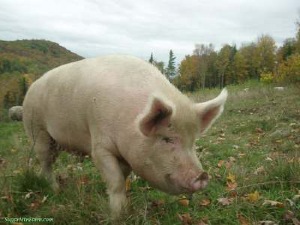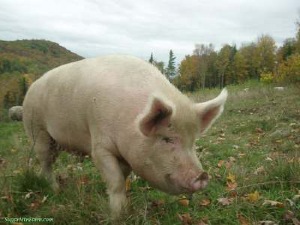 Get thee to a CAFO!Photo: pubwvjIn a recent op-ed, in The New York Times gravely informed its readers that free-range pork is deadly stuff.
Get thee to a CAFO!Photo: pubwvjIn a recent op-ed, in The New York Times gravely informed its readers that free-range pork is deadly stuff.
Despite evidence that incidence of trichinosis is very rare in the US–about 40 cases a year, and mostly caused by eating wild game (usually bear)-James E. McWilliams says that pork laced with the deadly parasite is just one example of how locavores are “endangering the future of food.” Mr. McWilliams, a history professor at Texas State University also wrote in the Times 2 years back that measuring food miles was bunk and that they were not an accurate measure of a food’s carbon footprint (again despite proof to the contrary, see this pdf from Rich Pirog at the Leopold Center, and these LTE responses). In addition, he likes to scare us with titles like this one from Slate: “Rusted Roots: Is organic agriculture polluting our food with heavy metals?”
As Upton Sinclair said, it’s difficult to convince a man of something when his salary depends on him not understanding it, and the study Mr. McWilliams cites was funded by the National Pork Producers Council, whose job it is to defend the interests of the major confinement hog producers and processors. It is of course exceedingly unlikely that the study would have found any differently than it did. Even if we were to take the Pork Board at their word, Paula Crossfield’s excellent rebuttal demonstrates why it’s really just bunkum. The short version is that the study found antibodies, not actual Trichinosis.
If that were not enough, there are numerous studies finding that the food industry is following the playbook of big tobacco, a tactic called FUD – sowing Fear, Uncertainty and Doubt in the public mind. See Tom Laskawy’s explanation on Grist, and the more science-minded version at e360.
Change is always fought, and power never relinquishes willingly. But the tied is turning in favor of Good, Clean, and Fair food. We simply do not have the bankroll to compete mano-a-mano with Big Ag on the stage of public opinion. So we’ll have to beat them with passion, logic, and law that brings better tasting, healthier food, rebuilds rural communities, improves the health of our children, and brings more jobs to more farms.



